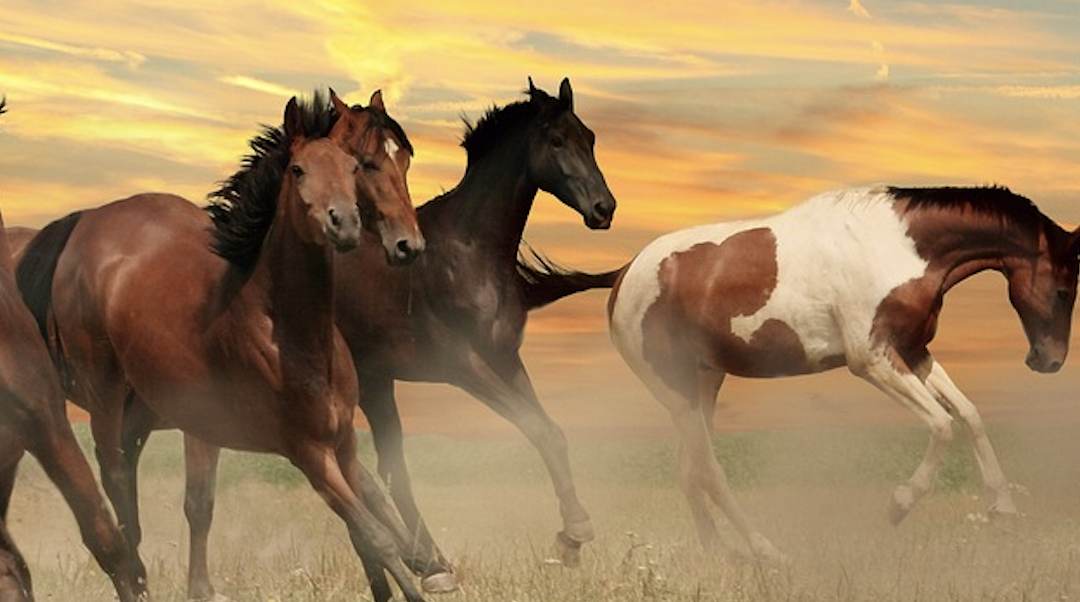Wild Things
First published in WNC Woman Magazine
Whenever we go for a hike in the woods, my husband carries a stick that he claims is for taming a bear. Wisely, the bears have steered clear, but the gleam in his eye speaks to a vision of himself as a sort of Grizzly Adams. This theme, and dream, of taming wild creatures doesn’t stop with bears. He talks about adopting the squirrel that gnaws on our gutters, of training the coyote that occasions our neighborhood, of how fun it would be to raise a tiger from a cub. During the pandemic, he actually got a chipmunk to eat out of his hand each morning.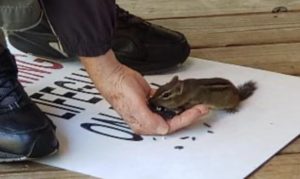
Not me. I like my wild things wild. I love to watch the squirrels chasing the other squirrels, the coyotes slinking around dodging human eyes, the bears lumbering unrestricted in the woods, their outsized presence expanding far beyond their bodies. These conflicting views of are why the only indoor pets we’ve had together have been ants, safely confined to an ant farm.
Our outdoor animals, however, have all been at least part wild. When we were in the Peace Corps in remote Papua New Guinea, three semi-domesticated dogs, sensing a regular food supply, adopted us. No one thought this odd, as dogs in that area didn’t belong to anyone in the sense that they do here. They belonged to themselves and their fidelities shifted with their doggy whims, which were greatly influenced by the availability of food.
I didn’t kid myself about the limits of their affection, though they were very affectionate. My part of the partnership was to provide a mix of fish, greens, and sweet potatoes each night and theirs was to warn us of intruders and to entertain us with their unfiltered personalities. I loved my various dogs growing up, but there is a difference between a dog bred to keep company with humans and dogs whose primary family were other dogs.
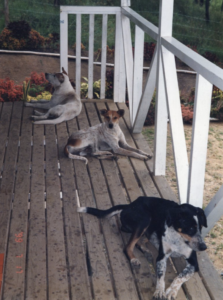 Dixie was an alpha-dog Casanova, who, when he was hungry, would find a woman cooking by an open fire. It really didn’t matter which woman, they all fell for his smooth style. He would sidle up next to her, stretch out at her side, and gaze up at her with hungry eyes. He would linger long enough for a leisurely meal and some strokes to his ego and his tummy, and then saunter off with her heart secured for a lifetime to his. His suave magic wasn’t limited to human females either; nearly every puppy within roaming distance had his characteristic black and brown spots.
Dixie was an alpha-dog Casanova, who, when he was hungry, would find a woman cooking by an open fire. It really didn’t matter which woman, they all fell for his smooth style. He would sidle up next to her, stretch out at her side, and gaze up at her with hungry eyes. He would linger long enough for a leisurely meal and some strokes to his ego and his tummy, and then saunter off with her heart secured for a lifetime to his. His suave magic wasn’t limited to human females either; nearly every puppy within roaming distance had his characteristic black and brown spots.
Next was Luta, a timid Robin to Dixie’s Batman, whose tail seemed stuck in a droop that said, “I know it’s hard to love me, but I’d be ever so grateful if you tried.” He lived in Dixie’s formidable shadow and fed off his scraps. We started feeding them separately, using a doggy gate and sliding door to confine them one at a time to the doggy dining porch. After several months of regular nutrition, Luta appeared one day with a weirdly raving look in his eyes, freshly washed from a bath in the river. As soon as he ate his dinner, he was off, stayed away for three days, and returned with the blissful, dazed exhaustion of a college student after his first Daytona Beach spring break. It was tail up full time after that, and with such an unmistakable shift in energy and confidence that I used him as an example for local women about what proper nutrition for a child could do. Sadly, this newly self-assured Luta came with a hunger to strut his newfound stuff and he regularly came back bloodied with bite marks. Our other dogs would lick his wounds and snuggle close so he could sleep without worry as he healed, and then he would be off again.
The last dog in the pecking order was Princess, an excitable little thing who relished the attention of the two male dogs when they were competing for her affection, but who would go back to her last home (from which Dixie and Luta were chased off with bush knives) in a huff when they ignored her or when they played too rough. She’d sneak back at times from these huff-fests when the boys were out wandering and sit with me on the porch, leaning into my side, eating every other bite of my banana.
What they gave me, aside from tons of laughter, good company, and protection, was a hint of what it might be like to live outside the rules of domesticity. They had their own rules, of course, which we tinkered with when we fed them separately as opposed to letting them fight it out as they otherwise might. But they planted a seed in me of what life might be like to live among “civilized society” and yet maintain a feral, or at least untamed, soul, free to roam, to love, and to live beyond our rigid social norms.
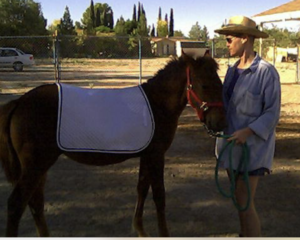 That seed broke open and sprouted with our next wild creatures, two mustangs fresh off the Nevada range, cut with a hundred others to thin a starving herd. Hershey was a six-month-old chocolate filly with a fierceness that oozed from her. Sheba was a 1-2-year-old filly more self-possessed than the stallions that were loaded into the trailers of their new caretakers before her. The stallions, intense as they were, reacted to the shouts and waving hands of the wranglers and boarded their trailers in less than 90 seconds. Sheba took 10 minutes. She didn’t fight, she just didn’t cooperate, like an equine conscientious objector, residing beyond the manipulations of force and fear. The only way to get her into the trailer, they decided, was for her to want to get in. So they loaded Hershey, who was still small enough to be manhandled into place and secured her in the front section. Then they stood back and waited. As if to show them who was really boss, Sheba calmly ate some of the hay that had fallen on the ground when they were trying to entice her with food, and after a few minutes, she stepped into the trailer, clear to all that it was her choice.
That seed broke open and sprouted with our next wild creatures, two mustangs fresh off the Nevada range, cut with a hundred others to thin a starving herd. Hershey was a six-month-old chocolate filly with a fierceness that oozed from her. Sheba was a 1-2-year-old filly more self-possessed than the stallions that were loaded into the trailers of their new caretakers before her. The stallions, intense as they were, reacted to the shouts and waving hands of the wranglers and boarded their trailers in less than 90 seconds. Sheba took 10 minutes. She didn’t fight, she just didn’t cooperate, like an equine conscientious objector, residing beyond the manipulations of force and fear. The only way to get her into the trailer, they decided, was for her to want to get in. So they loaded Hershey, who was still small enough to be manhandled into place and secured her in the front section. Then they stood back and waited. As if to show them who was really boss, Sheba calmly ate some of the hay that had fallen on the ground when they were trying to entice her with food, and after a few minutes, she stepped into the trailer, clear to all that it was her choice.
I had the honor of being the first human to work with Hershey, and stood along the inside wall of her pen with a handful of hay as she ran around it venting her frustration at being enclosed. After a half hour, she’d take a bit of hay each time she ran by me, and by the end of the afternoon she would stand and eat out of my hand in what was clearly a partnership, not an ownership. Hershey was able to withdraw from that partnership at any time. Perhaps not physically, as her care was now in human hands, but in the absence of a human she wanted to love, she had her wildness of heart and the community of other horses to sustain her.
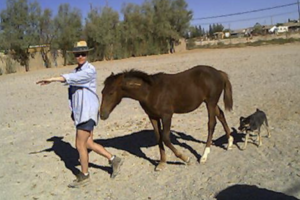 Even now there is something that takes my breath away about her, that broke open my heart that day in a new way. It was as if in opening her heart to me just that little bit, she spilled into mine the experience of being free, of being wild, of being unbound by the pens that life tries so hard to cage us in. Of, simply, being.
Even now there is something that takes my breath away about her, that broke open my heart that day in a new way. It was as if in opening her heart to me just that little bit, she spilled into mine the experience of being free, of being wild, of being unbound by the pens that life tries so hard to cage us in. Of, simply, being.
You take a chance with the heart of a wild one, just like you take a chance alone in the wild. Wild beings do not have to love you; they do not have to accept you. A being that is not bred in captivity has a choice to enter into relationship in a way that a domesticated animal does not. They can choose to keep their heart unclaimed and remain free at the core of their being. The reward of risking your heart with them, though, is that they can gift you a quality not found in animals whose early circle of life included human love. The fierce power of their presence can snip the strings of your domesticity and allow you to experience the unbridled power beneath it, where the true you lies, waiting to be unleashed on the world.
True to form, my husband was an excellent and compassionate trainer for these wild ones, teaching them, among other interesting skills, how to poop in a bucket. I loved to run with them in the field, nap with them in their stalls, commune with the glorious spirits of these beings, and hope that little by little their knowing of the wildness within would keep snipping the strings around my tethered heart until that final, fabulous strand that once cut would set me free.
Let’s Get Social

About Kristine
Pushing the edges of my consciousness has been my passion for as long as I can remember. This has flowed me into writing, podcasting, and becoming a hypnotherapist to help others push past limiting perceptions and expand their awareness and possibilities, too. Welcome to my world. Thanks for visiting!
